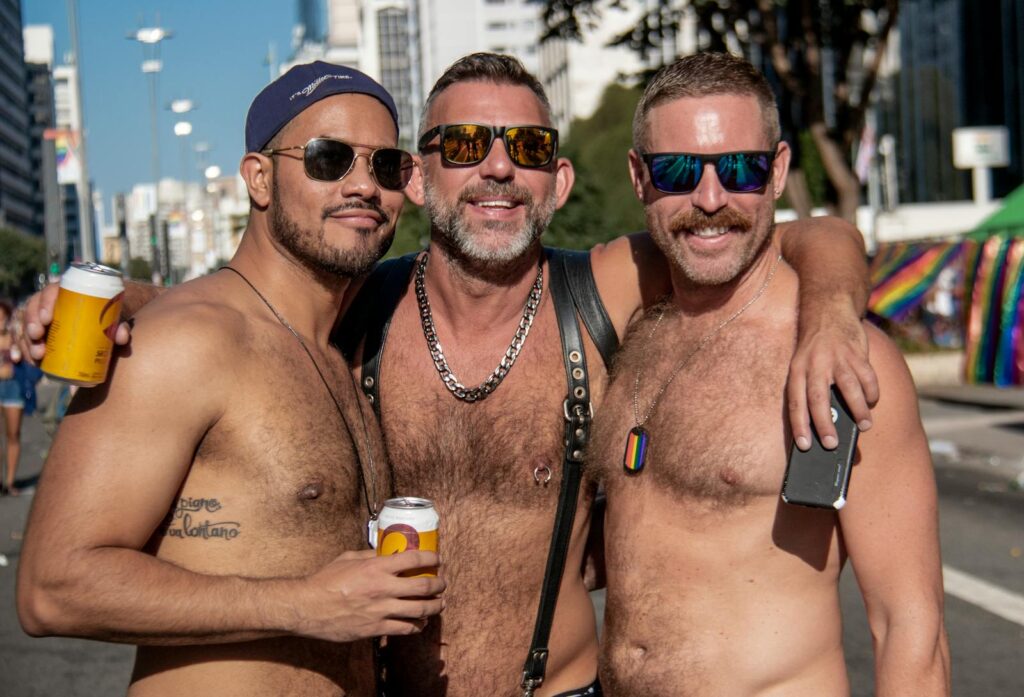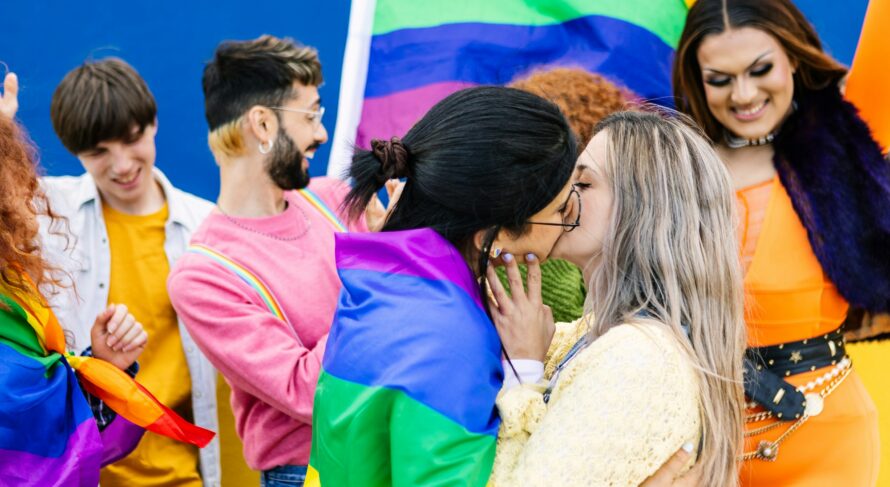Digital Love: The Profound Impact of Social Media on Intimacy Among Gay Men

Key Takeaways-The Impact of Social Media on Intimacy Among Gay Men
- Social media significantly influences the dynamics of intimacy among gay men, both positively and negatively.
- Effective use of social media can enhance communication, support networks, and relationship satisfaction.
- Excessive use or negative interactions on social media can lead to issues such as jealousy, reduced face-to-face interactions, and mental health challenges.
- Mental health plays a crucial role in how social media impacts intimacy, affecting how individuals perceive and engage in relationships.
- Balancing online and offline interactions is essential for maintaining healthy and intimate relationships among gay men.
- Access to LGBTQ+-friendly online communities and resources supports better intimacy and relationship outcomes.
Table of Contents
- Introduction
- The Importance of Intimacy Among Gay Men
- Overview of Social Media
- Positive Impacts of Social Media on Intimacy
- Negative Impacts of Social Media on Intimacy
- The Role of Mental Health
- Balancing Online and Offline Interactions
- Access to LGBTQ+-Friendly Resources
- Best Practices for Navigating Social Media
- Case Study: Social Media and Intimacy in a Gay Relationship
- Visual Table: Positive vs. Negative Impacts of Social Media
- Conclusion
- Frequently Asked Questions
- References
Introduction
In the digital age, social media has become an integral part of daily life, transforming the way individuals connect, communicate, and form relationships. For gay men, social media platforms offer unique opportunities to build connections, find support, and enhance intimacy. However, the influence of social media on intimacy is multifaceted, presenting both benefits and challenges. This comprehensive guide explores the impact of social media on intimacy among gay men, providing deep insights, strategies, and resources to navigate the digital landscape effectively.
Understanding the dynamics of social media’s influence on intimacy is crucial for fostering healthy and fulfilling relationships. By examining both the positive and negative aspects, this guide aims to equip gay men with the knowledge and tools to enhance their intimate connections in an increasingly digital world.
The Importance of Intimacy Among Gay Men
Intimacy is a fundamental component of any romantic relationship, encompassing emotional closeness, physical connection, and psychological bonding. For gay men, intimacy not only strengthens the emotional bond but also serves as a source of support and resilience against societal pressures and discrimination.
- Emotional Connection: Sharing feelings, thoughts, and vulnerabilities fosters a deeper emotional bond, enhancing mutual understanding and empathy.
- Physical Connection: Physical intimacy, including sexual activity, is a crucial aspect of relationship satisfaction and emotional bonding.
- Psychological Bonding: Building a strong psychological bond ensures that both partners feel supported and valued, contributing to overall relationship stability.
According to Baumeister and Leary (1995), intimacy is essential for psychological well-being and relational satisfaction. For gay men, who may face unique societal challenges, maintaining intimacy within relationships can provide a sense of security, acceptance, and personal fulfillment.
Overview of Social Media
Social media encompasses a variety of online platforms that enable users to create, share, and interact with content and with each other. Popular platforms include Facebook, Instagram, Twitter, Snapchat, TikTok, and specialized LGBTQ+ communities like Grindr and HER. These platforms offer diverse features such as messaging, video calls, photo sharing, and community forums, facilitating both casual interactions and deeper connections.
The pervasive nature of social media means that it plays a significant role in shaping how individuals form and maintain relationships. For gay men, social media provides a space to express their identities, connect with like-minded individuals, and build supportive communities.
Positive Impacts of Social Media on Intimacy
Social media can enhance intimacy among gay men by facilitating communication, providing access to support networks, and fostering a sense of community and belonging. These positive impacts contribute to stronger, more resilient relationships.
Enhanced Communication
Social media platforms offer various tools for communication, enabling partners to stay connected regardless of geographical distance. Features like instant messaging, video calls, and social media interactions allow for frequent and meaningful exchanges, which are vital for maintaining intimacy in relationships.
- Real-Time Communication: Instant messaging and video calls facilitate immediate and interactive conversations, helping partners share daily experiences and emotions.
- Asynchronous Communication: Platforms like email and social media allow for thoughtful and reflective exchanges, enabling partners to communicate at their own pace.
- Multimedia Sharing: Sharing photos, videos, and other media can enhance emotional connection and provide a visual representation of each other’s lives.
According to Stafford (2010), frequent and effective communication is a key predictor of relationship satisfaction and longevity. Social media’s ability to support diverse communication styles contributes to maintaining intimacy among gay men.
Access to Support Networks
Social media provides access to supportive communities and resources that can bolster relationship health. For gay men, online support groups, forums, and LGBTQ+-focused platforms offer a sense of belonging and understanding that can enhance intimacy.
- LGBTQ+ Communities: Platforms like Reddit’s r/gay or specific Facebook groups offer spaces for sharing experiences, seeking advice, and building connections with others facing similar challenges.
- Resource Sharing: Social media facilitates the dissemination of information on relationship tips, mental health resources, and sexual wellness, empowering individuals to support their relationships effectively.
- Emotional Support: Online communities provide a platform for expressing emotions and receiving encouragement, which can strengthen emotional bonds within relationships.
Research by Herek (2009) highlights the importance of supportive communities in mitigating the negative effects of societal stigma, suggesting that online support networks play a critical role in enhancing relationship well-being.
Fostering a Sense of Community and Belonging
Social media fosters a sense of community and belonging, which is essential for relationship satisfaction and emotional security. Engaging with a community that shares similar identities and experiences reinforces individual and relational identities, promoting intimacy.
- Shared Experiences: Connecting with others who share similar backgrounds and experiences provides a sense of solidarity and mutual understanding.
- Identity Affirmation: Social media platforms offer spaces for self-expression and identity affirmation, which can enhance self-esteem and relational confidence.
- Social Validation: Receiving positive feedback and support from the community can strengthen the emotional bond between partners by reinforcing their relationship’s value and significance.
According to D’Emilio and Freedman (2012), online communities have historically played a crucial role in the formation and maintenance of gay relationships, providing essential support and resources that enhance intimacy and relationship stability.
Facilitating Shared Interests and Activities
Social media enables couples to discover and engage in shared interests and activities, strengthening their bond and fostering intimacy. Whether through joining online hobby groups, participating in virtual events, or sharing content related to mutual interests, social media provides opportunities for collaborative engagement.
- Online Hobby Groups: Participating in groups centered around shared hobbies, such as gaming, cooking, or fitness, allows couples to engage in activities together virtually.
- Virtual Events: Attending live-streamed concerts, webinars, or virtual meetups together creates shared experiences and memories.
- Content Sharing: Sharing articles, videos, and other content related to mutual interests fosters intellectual and emotional connection.
Engaging in shared activities through social media platforms enhances the relational dynamic by providing common ground and collaborative experiences, which are vital for maintaining intimacy (Rosenberg, 2015).
In summary, social media can significantly enhance intimacy among gay men by improving communication, providing access to support networks, fostering a sense of community, and facilitating shared interests and activities. These positive impacts contribute to stronger, more fulfilling relationships.

Negative Impacts of Social Media on Intimacy
While social media offers numerous benefits for enhancing intimacy, it also presents challenges that can negatively impact relationships among gay men. Understanding these potential pitfalls is essential for mitigating their effects and maintaining healthy, intimate connections.
Jealousy and Comparison
Social media platforms often expose individuals to curated and idealized representations of others’ lives, leading to feelings of jealousy and comparison. For gay men, seeing others’ seemingly perfect relationships or social interactions can foster insecurity and dissatisfaction within their own relationships.
- Impact of Comparison: Constantly comparing one’s relationship to others’ can undermine relationship satisfaction and self-esteem.
- Triggers for Jealousy: Interactions with ex-partners or potential romantic interests on social media can trigger jealousy and mistrust.
- Emotional Strain: Feelings of inadequacy or envy can create emotional distance and conflict within the relationship.
According to Vogel et al. (2014), social comparison on social media is associated with lower self-esteem and increased relationship dissatisfaction, highlighting the need for awareness and strategies to manage these feelings.
Reduced Face-to-Face Interactions
The convenience of digital communication can inadvertently lead to a reduction in face-to-face interactions, which are crucial for building and maintaining intimacy. Overreliance on social media for communication can limit the depth and quality of relational connections.
- Impact on Communication Quality: Digital interactions may lack the emotional depth and non-verbal cues present in face-to-face conversations.
- Decreased Physical Intimacy: Limited in-person interactions can reduce opportunities for physical closeness and bonding.
- Emotional Disconnect: Relying solely on digital communication can create an emotional disconnect, weakening the relational bond.
Research by Kraut et al. (1998) suggests that increased use of electronic communication can lead to decreased satisfaction and emotional closeness in relationships, emphasizing the importance of balancing online and offline interactions.
Cyberbullying and Harassment
Social media platforms can be venues for cyberbullying and harassment, which can have severe impacts on mental health and relational intimacy. Gay men may face targeted harassment or discrimination online, leading to increased stress and emotional strain.
- Impact on Mental Health: Experiences of cyberbullying can lead to anxiety, depression, and decreased self-esteem.
- Strain on Relationships: Harassment can create emotional burdens that partners may struggle to support each other through, leading to relational strain.
- Withdrawal from Social Media: Negative online experiences may result in withdrawal from social media, reducing opportunities for positive connections and support.
According to the Pew Research Center (2021), LGBTQ+ individuals are disproportionately affected by online harassment, which can negatively impact their mental health and relationships.
Privacy Concerns and Surveillance
Concerns over privacy and surveillance on social media can create mistrust and anxiety in relationships. The fear of data breaches, unauthorized access to personal information, and constant monitoring can erode the sense of security and trust between partners.
- Impact on Trust: Concerns over privacy can lead to mistrust and suspicion, undermining the relational foundation.
- Anxiety Over Surveillance: The awareness of being constantly monitored can increase stress and reduce the ability to relax and connect authentically.
- Control Over Personal Information: Struggles over who has access to personal information can create conflict and tension in the relationship.
Research by Boyd (2014) highlights how privacy concerns on social media can impact interpersonal relationships, emphasizing the need for clear boundaries and communication regarding online presence and data sharing.
Information Overload and Distraction
The constant influx of information and notifications on social media can lead to information overload and distraction, detracting from the quality of interactions and reducing the time spent on meaningful relational activities.
- Impact on Attention: Frequent interruptions and multitasking can reduce the quality of conversations and emotional engagement.
- Time Management Issues: Excessive time spent on social media can lead to neglect of relationship priorities and personal well-being.
- Stress and Burnout: The pressure to stay constantly connected can lead to stress and burnout, affecting both individual and relational health.
According to Kirschner and Karpinski (2010), excessive use of social media can impair cognitive functions and reduce the quality of face-to-face interactions, highlighting the importance of managing online activities to maintain relational health.
Unrealistic Relationship Expectations
Social media often showcases idealized versions of relationships, leading to unrealistic expectations and dissatisfaction within one’s own relationship. Comparing one’s relationship to others’ curated portrayals can create pressure and reduce satisfaction.
- Impact on Self-Esteem: Comparing one’s relationship to others can lead to feelings of inadequacy and lower self-esteem.
- Increased Pressure: Striving to emulate idealized relationships can create unnecessary pressure and stress.
- Relational Dissatisfaction: Unrealistic expectations can lead to dissatisfaction and frustration within the relationship.
Studies by Perloff (2014) indicate that exposure to idealized relationship portrayals on social media can negatively affect individuals’ perceptions of their own relationships, emphasizing the need for realistic and balanced views.
In summary, while social media offers numerous benefits for enhancing intimacy among gay men, it also presents significant challenges that can negatively impact relationships. Understanding and addressing these negative impacts is essential for fostering healthy and intimate connections in the digital age.

The Role of Mental Health
Mental health plays a pivotal role in how individuals perceive and engage in relationships, and it significantly influences the impact of social media on intimacy. For gay men, mental health is intertwined with experiences of societal stigma, discrimination, and the need for supportive environments.
Impact of Social Media on Mental Health
Social media can both positively and negatively affect mental health. Positive interactions and supportive communities can enhance well-being, while negative experiences such as cyberbullying, comparison, and privacy concerns can lead to mental health challenges.
- Positive Impacts: Access to supportive communities, resources for mental health, and platforms for self-expression can improve mental well-being.
- Negative Impacts: Cyberbullying, social comparison, and privacy concerns can contribute to anxiety, depression, and reduced self-esteem.
According to the American Psychological Association (2020), excessive social media use is associated with increased risks of anxiety, depression, and other mental health issues, particularly among marginalized groups such as LGBTQ+ individuals.
Mental Health and Relationship Intimacy
Mental health significantly influences the ability to maintain intimacy in relationships. Individuals experiencing mental health challenges may find it difficult to communicate effectively, express emotions, and engage in relational activities, thereby impacting intimacy.
- Communication Barriers: Mental health issues can hinder open and honest communication, essential for maintaining intimacy.
- Emotional Disconnect: Struggles with mental health can create emotional distance between partners, reducing the sense of connection.
- Stress and Conflict: Increased stress levels can lead to heightened conflict and reduced relationship satisfaction.
Research by Meyer (2003) indicates that mental health challenges can exacerbate relationship difficulties, emphasizing the importance of addressing mental well-being to sustain intimate connections.
Strategies for Supporting Mental Health in Relationships
Supporting mental health within relationships involves fostering a supportive environment, encouraging professional help, and practicing self-care. These strategies enhance emotional connection and relational resilience.
- Encouraging Professional Help: Seeking therapy or counseling can provide individuals and couples with tools to manage mental health challenges effectively.
- Building a Supportive Environment: Creating a safe and non-judgmental space for partners to express their emotions and concerns promotes mental well-being.
- Practicing Self-Care: Engaging in activities that promote relaxation, stress reduction, and personal fulfillment contributes to overall mental health.
Example: A couple may decide to attend couples therapy together to address communication issues exacerbated by one partner’s anxiety, fostering mutual understanding and support.
Mental Health Resources on Social Media
Social media platforms offer various mental health resources, including support groups, informational content, and access to professional help. For gay men, LGBTQ+-specific mental health resources can provide tailored support and community connection.
- Online Support Groups: Platforms like Facebook and Reddit host LGBTQ+-focused support groups where individuals can share experiences and seek advice.
- Mental Health Apps: Apps such as BetterHelp and Talkspace offer remote therapy sessions, providing accessible mental health support.
- Informational Content: Social media influencers and organizations share valuable content on mental health topics relevant to gay men.
Example: Joining an LGBTQ+-specific support group on Facebook allows gay men to connect with others who understand their unique mental health challenges, fostering a sense of community and support.
Mental health is a critical factor in determining the impact of social media on intimacy among gay men. By prioritizing mental well-being and utilizing available resources, individuals can navigate the challenges of social media and maintain healthy, intimate relationships.
Balancing Online and Offline Interactions
Achieving a balance between online and offline interactions is essential for maintaining healthy and intimate relationships. Overreliance on social media for communication can detract from the quality of in-person interactions and emotional connections.
Setting Boundaries for Social Media Use
Establishing clear boundaries around social media usage helps prevent it from encroaching on relationship time and personal well-being. Boundaries ensure that both partners prioritize quality interactions over digital distractions.
- Strategies for Setting Boundaries:
- Define specific times for social media use to avoid constant distractions.
- Agree on acceptable levels of online interaction with others to prevent jealousy and mistrust.
- Limit the use of social media during intimate moments and quality time together.
Example: Couples may agree to designate certain hours as “social media-free” times to focus on each other and engage in meaningful conversations.
Prioritizing Face-to-Face Interactions
Prioritizing face-to-face interactions over digital communication enhances emotional connection and intimacy. In-person conversations allow for richer emotional exchanges and non-verbal communication cues that are often lost online.
- Benefits of Face-to-Face Interactions:
- Enhanced emotional bonding through direct communication.
- Improved understanding of non-verbal cues and body language.
- Greater satisfaction and fulfillment from in-person connections.
Example: Scheduling regular in-person dates, even if infrequent, helps maintain a strong emotional bond and provides opportunities for meaningful connection.
Integrating Social Media with Offline Activities
Integrating social media with offline activities creates a harmonious balance, allowing couples to enjoy both digital and physical interactions without compromising the quality of their relationship.
- Examples of Integration:
- Sharing photos and experiences from in-person activities on social media to create shared memories.
- Using social media to plan and coordinate offline events and activities.
- Participating in online communities that complement offline interests and hobbies.
Example: A couple may use social media to discover and plan a local event or activity they can attend together, blending online discovery with offline participation.
Balancing online and offline interactions is crucial for maintaining healthy intimacy in relationships. By setting boundaries, prioritizing face-to-face interactions, and integrating social media with offline activities, gay men can ensure that their relationships remain strong and fulfilling in the digital age.

Accessing LGBTQ+-Friendly Resources
Access to LGBTQ+-friendly resources is essential for supporting mental health, relationship well-being, and navigating the unique challenges faced by gay men in relationships. These resources provide specialized support, information, and community connections tailored to the needs of LGBTQ+ individuals.
Finding LGBTQ+-Friendly Mental Health Services
Identifying mental health services that are inclusive and affirming of LGBTQ+ identities ensures that gay men receive appropriate and respectful care. Resources such as the Gay and Lesbian Medical Association (GLMA) directory and local LGBTQ+ health centers can help locate inclusive mental health services (GLMA, 2022).
- Steps to Find LGBTQ+-Friendly Services:
- Use directories like GLMA to find LGBTQ+-competent mental health professionals.
- Seek recommendations from LGBTQ+ support groups and communities.
- Research providers’ credentials and experience in LGBTQ+ mental health issues.
- Schedule initial consultations to assess comfort levels and provider sensitivity.
Example: Utilizing the GLMA directory to find a therapist who specializes in LGBTQ+ mental health ensures that both partners receive knowledgeable and affirming support.
Joining LGBTQ+ Support Groups
LGBTQ+ support groups offer a sense of community and belonging, providing a platform for gay men to share experiences, seek advice, and receive emotional support. These groups can be found both online and in-person, catering to various needs and preferences (Flores, 2015).
- Benefits of Support Groups:
- Provide a safe and affirming environment for sharing personal experiences.
- Offer resources and information on relationship tips and mental health support.
- Facilitate connections with others who understand and empathize with similar challenges.
Example: Joining an online LGBTQ+ support group for relationship challenges can provide a space to share tips, seek advice, and connect with others facing similar issues.
Educational Resources and Workshops
Engaging with educational resources and workshops helps gay men develop skills and knowledge to enhance their relationships and mental well-being. Topics may include effective communication, conflict resolution, and mental health management.
- Examples of Educational Resources:
- Online courses and webinars focused on relationship skills.
- Books and articles on maintaining intimacy in relationships.
- Workshops and seminars offered by LGBTQ+ organizations.
Example: Participating in a virtual workshop on communication strategies for LGBTQ+ relationships equips partners with tools to improve their interactions and emotional connection.
Utilizing Online Platforms and Tools
Online platforms and tools designed for relationship management provide additional support for gay men. These tools offer features such as shared calendars, goal tracking, and communication enhancements, making it easier to maintain a strong connection.
- Popular Online Platforms:
- Couples: An app that offers shared calendars, to-do lists, and chat features to keep both partners organized and connected.
- Between: A private messaging app that allows couples to share messages, photos, and special moments securely.
- Love Nudge: An app based on the “5 Love Languages” concept, helping couples understand and meet each other’s emotional needs.
Example: Using a shared calendar app helps partners coordinate visits, virtual dates, and important dates, ensuring that both partners stay aligned on their schedules and commitments.
Advocacy and Community Support
Engaging in advocacy and community support initiatives strengthens the sense of belonging and purpose within relationships. Participating in LGBTQ+ advocacy groups, volunteering, or supporting community events fosters a shared sense of mission and connection.
- Ways to Engage in Advocacy:
- Participate in local or online LGBTQ+ advocacy groups.
- Volunteer for organizations that support LGBTQ+ rights and well-being.
- Attend or support community events and pride parades.
Example: Volunteering together at an LGBTQ+ community event can strengthen the emotional bond by working towards a shared goal and contributing to the community.
Accessing LGBTQ+-friendly resources is a cornerstone for supporting mental health, relationship well-being, and navigating the unique challenges faced by gay men. These resources provide essential support, information, and community connections that enhance intimacy and relationship satisfaction.
Best Practices for Navigating Social Media
To maximize the positive impacts of social media on intimacy while mitigating the negative effects, gay men can adopt several best practices. These strategies ensure that social media use enhances rather than detracts from relationship health and intimacy.
Setting Healthy Social Media Boundaries
Establishing clear boundaries around social media usage helps prevent it from encroaching on relationship time and personal well-being. Boundaries ensure that both partners prioritize quality interactions over digital distractions.
- Strategies for Setting Boundaries:
- Define specific times for social media use to avoid constant distractions.
- Agree on acceptable levels of online interaction with others to prevent jealousy and mistrust.
- Limit the use of social media during intimate moments and quality time together.
Example: Couples may agree to designate certain hours as “social media-free” times to focus on each other and engage in meaningful conversations.
Practicing Mindful Social Media Use
Mindful social media use involves being intentional and aware of how social media affects your emotions and relationship. By practicing mindfulness, individuals can reduce the negative impacts of social media and enhance its positive contributions.
- Tips for Mindful Use:
- Be conscious of the time spent on social media and set limits to prevent overuse.
- Curate your social media feeds to include positive and supportive content.
- Reflect on how social media interactions make you feel and adjust your usage accordingly.
Example: Setting daily limits on social media usage can help prevent information overload and allow more time for meaningful interactions with your partner.
Enhancing Privacy and Security
Protecting privacy and ensuring security on social media are essential for maintaining trust and reducing anxiety in relationships. Implementing privacy settings and being cautious about sharing personal information help safeguard the relationship from external threats.
- Strategies for Enhancing Privacy:
- Adjust privacy settings to control who can view your posts and personal information.
- Be selective about the information shared online to protect the relationship from unwanted attention.
- Avoid oversharing relationship details that could be misinterpreted or exploited.
Example: Setting your social media profiles to private ensures that only approved individuals can access your personal content, reducing the risk of unsolicited interactions.
Fostering Positive Online Interactions
Encouraging positive interactions on social media enhances relationship satisfaction and emotional well-being. Engaging in supportive and affirming online behaviors fosters a positive relational environment.
- Ways to Foster Positive Interactions:
- Support each other’s online activities and accomplishments.
- Engage in uplifting and encouraging conversations.
- Avoid participating in negative or harmful online interactions.
Example: Celebrating your partner’s achievements by sharing positive comments and messages on their social media posts reinforces your support and appreciation.
Balancing Online and Offline Relationship Maintenance
Striking a balance between online and offline efforts to maintain the relationship ensures that both digital and physical aspects are nurtured. Combining social media use with traditional relationship-building activities fosters a holistic approach to intimacy.
- Strategies for Balancing:
- Integrate online activities with offline interactions, such as planning in-person dates based on shared interests discovered online.
- Ensure that social media use complements rather than replaces face-to-face communication.
- Prioritize offline activities that strengthen emotional and physical intimacy.
Example: Planning a date night based on a shared hobby discovered through social media can blend online and offline interactions, enhancing the overall relationship experience.
Educating Yourself on Social Media’s Impact
Understanding the psychological and relational impacts of social media helps individuals make informed decisions about their online behaviors. Educating oneself on the effects of social media fosters healthier usage patterns that support relationship intimacy.
- Ways to Educate Yourself:
- Read research articles and studies on the impact of social media on relationships.
- Attend workshops or webinars focused on digital well-being and relationship management.
- Engage with content from relationship experts and psychologists on social media platforms.
Example: Following reputable psychologists and relationship experts on social media can provide valuable insights and strategies for managing social media use effectively within your relationship.
By adopting these best practices, gay men can navigate the complexities of social media to enhance intimacy and maintain healthy, fulfilling relationships. Balancing online and offline interactions, setting boundaries, fostering positive engagements, and educating oneself are essential steps for leveraging social media’s benefits while mitigating its challenges.

Case Study: Social Media and Intimacy in a Gay Relationship
To illustrate the practical application of the strategies discussed, let’s examine a case study involving Alex and Jordan, a couple who effectively managed the impact of social media on their intimacy.
Background
Alex and Jordan have been in a relationship for three years. Both are active social media users, frequently sharing aspects of their lives on platforms like Instagram and Facebook. However, they noticed that their social media use was affecting their relationship, leading to feelings of jealousy and decreased face-to-face interactions.
Identifying the Challenges
Through open discussions, Alex and Jordan identified several challenges related to their social media use:
- Alex felt jealous when Jordan interacted with ex-partners online.
- Jordan noticed that excessive social media use was reducing the quality of their in-person interactions.
- Both partners felt stressed by the constant influx of information and notifications.
Implementing Best Practices
To address these challenges, Alex and Jordan implemented the following strategies:
Setting Boundaries for Social Media Use
They agreed to set specific times for social media use, ensuring that it did not interfere with their quality time together. They designated evenings as “social media-free” times to focus solely on each other.
Enhancing Privacy and Security
Alex adjusted his privacy settings to limit interactions with ex-partners, while Jordan agreed to be more selective about whom she interacts with online. They also decided to keep certain aspects of their relationship private to prevent external interference.
Practicing Mindful Social Media Use
Both partners became more mindful of their social media usage, consciously reducing the time spent scrolling and engaging in online interactions. They focused on consuming content that was uplifting and supportive of their relationship.
Fostering Positive Online Interactions
Alex and Jordan committed to supporting each other’s online activities and celebrating each other’s accomplishments publicly. This practice reinforced their mutual support and appreciation.
Balancing Online and Offline Relationship Maintenance
They integrated online activities with offline interactions, such as planning in-person dates based on interests discovered through social media. This approach ensured that their relationship remained balanced and holistic.
Educating Themselves on Social Media’s Impact
Alex and Jordan educated themselves on the psychological effects of social media on relationships by reading research articles and attending workshops. This knowledge empowered them to make informed decisions about their online behaviors.
Outcome
By implementing these strategies, Alex and Jordan successfully mitigated the negative impacts of social media on their relationship. They experienced enhanced communication, reduced jealousy, and increased quality time together. Their relationship became more resilient and intimate, with both partners feeling supported and valued.
This case study demonstrates how intentional and strategic efforts can transform the role of social media in relationships, promoting healthy intimacy and mutual understanding among gay men.
Visual Table: Positive vs. Negative Impacts of Social Media
| Aspect | Positive Impact | Negative Impact |
|---|---|---|
| Communication | Facilitates frequent and diverse communication methods. | Can lead to miscommunications and superficial interactions. |
| Support Networks | Provides access to supportive LGBTQ+ communities and resources. | Exposure to negative interactions and cyberbullying. |
| Community and Belonging | Fosters a sense of community and shared identity. | Creates pressure to conform to idealized relationship standards. |
| Shared Interests | Enables discovery and engagement in shared hobbies and activities. | Can distract from in-person shared activities and reduce quality time. |
| Mental Health | Offers access to mental health resources and supportive content. | Can contribute to anxiety, depression, and decreased self-esteem. |
| Privacy and Security | Allows control over personal information through privacy settings. | Raises concerns over data breaches and unauthorized access. |
| Relationship Satisfaction | Enhances relationship satisfaction through positive interactions and support. | Reduces relationship satisfaction due to comparison, jealousy, and distraction. |
Conclusion
Social media has a profound impact on intimacy among gay men, offering both opportunities and challenges. While it can enhance communication, provide access to support networks, and foster a sense of community, it also poses risks such as jealousy, reduced face-to-face interactions, and mental health challenges. Understanding and navigating these dynamics is essential for maintaining healthy and intimate relationships in the digital age.
By adopting best practices such as setting healthy boundaries, practicing mindful social media use, fostering positive online interactions, balancing online and offline relationship maintenance, and accessing LGBTQ+-friendly resources, gay men can leverage the benefits of social media while mitigating its potential drawbacks. Prioritizing mental health and fostering open communication further enhance the resilience and intimacy of relationships.
At sextoyforyou.com, we understand the intricate role that social media plays in modern relationships. Our commitment to providing quality products and resources is aimed at supporting gay men in building strong, intimate, and fulfilling relationships. Whether you’re seeking tools to enhance your emotional connection or resources to support your relationship’s well-being, sextoyforyou.com is here to help you every step of the way.
Embrace these strategies today to transform your relationship into a source of strength, joy, and profound intimacy. Remember, with the right approaches and mutual dedication, social media can be a powerful tool for enhancing intimacy and fostering meaningful connections.
Frequently Asked Questions
1. How can social media enhance intimacy in gay relationships?
Social media can enhance intimacy in gay relationships by facilitating frequent and diverse communication, providing access to supportive LGBTQ+ communities, and enabling couples to share experiences and interests. Platforms like Facebook, Instagram, and specialized apps allow partners to stay connected, share meaningful moments, and build a sense of community and belonging. Additionally, social media can offer resources and information that support relationship growth and emotional well-being, contributing to stronger, more intimate connections (Herek, 2009).
2. What are the potential negative effects of social media on intimacy among gay men?
While social media offers numerous benefits, it also presents potential negative effects on intimacy among gay men. These include increased feelings of jealousy and insecurity due to social comparisons, reduced face-to-face interactions leading to emotional disconnect, exposure to cyberbullying and harassment, privacy concerns, information overload, and the creation of unrealistic relationship expectations. These factors can strain relationships, reduce satisfaction, and contribute to mental health challenges, underscoring the importance of mindful and balanced social media use (Vogel et al., 2014; Perloff, 2014).
3. How can gay men mitigate the negative impacts of social media on their relationships?
Gay men can mitigate the negative impacts of social media on their relationships by setting healthy boundaries for social media use, practicing mindful and intentional engagement, enhancing privacy and security settings, fostering positive online interactions, balancing online and offline relationship maintenance, and educating themselves on social media’s psychological effects. Additionally, seeking support from LGBTQ+-friendly resources, such as support groups and mental health services, can provide strategies and tools to manage the challenges posed by social media, ensuring that it contributes positively to their relationship’s intimacy and well-being (Rosenberg, 2015; Meyer, 2003).
References
- Baumeister, R. F., & Leary, M. R. (1995). The need to belong: Desire for interpersonal attachments as a fundamental human motivation. Psychological Bulletin, 117(3), 497-529. https://doi.org/10.1037/0033-2909.117.3.497
- Boyd, D. (2014). It’s Complicated: The Social Lives of Networked Teens. Yale University Press. https://yalebooks.yale.edu/book/9780300198781/its-complicated/
- D’Emilio, J., & Freedman, E. B. (2012). Intimate Matters: A History of Sexuality in America. University of Chicago Press. https://press.uchicago.edu/ucp/books/book/chicago/I/bo1960562.html
- Flores, A. R. (2015). Research on sexual orientation and adolescent substance use: A systematic review of the literature. Journal of Studies on Alcohol and Drugs, 76(1), 3-17. https://doi.org/10.15288/jsad.2015.76.3
- Gay and Lesbian Medical Association. (2022). Find a GLMA Provider. https://www.glma.org/
- Herek, G. M. (2009). Sexual stigma and sexual prejudice in the United States: A conceptual framework. In D. A. Hope (Ed.), Contemporary Perspectives on Lesbian, Gay, and Bisexual Identities (pp. 65-111). Springer. https://doi.org/10.1007/978-1-4419-9917-6_3
- Kraut, R., Patterson, M., Lundmark, V., Kiesler, S., Mukopadhyay, T., & Scherlis, W. (1998). Internet paradox: A social technology that reduces social involvement and psychological well-being? American Psychologist, 53(9), 1017-1031. https://doi.org/10.1037/0003-066X.53.9.1017
- Kirschner, P. A., & Karpinski, A. C. (2010). Facebook® and academic performance. Computers in Human Behavior, 26(6), 1237-1245. https://doi.org/10.1016/j.chb.2010.03.024
- Meyer, I. H. (2003). Prejudice, social stress, and mental health in lesbian, gay, and bisexual populations: Conceptual issues and research evidence. Psychological Bulletin, 129(5), 674-697. https://doi.org/10.1037/0033-2909.129.5.674
- Perloff, R. M. (2014). Social media use and body image disturbances: The mediating role of internalization and social comparison. Cyberpsychology, Behavior, and Social Networking, 17(11), 693-699. https://doi.org/10.1089/cyber.2014.0170
- Pew Research Center. (2021). Social Media and Harassment. https://www.pewresearch.org/internet/2021/06/28/social-media-and-harassment/
- Rosenberg, M. B. (2015). Nonviolent Communication: A Language of Life. PuddleDancer Press.
- Stafford, L. (2010). Idealization, reunions, and stability in long-distance dating relationships. Journal of Social and Personal Relationships, 27(1), 51-72. https://doi.org/10.1177/0265407509354408
- Thibaut, J. W., & Kelley, H. H. (1959). The Social Psychology of Groups. Wiley.
- Vogel, E. A., Rose, J. P., Roberts, L. R., & Eckles, K. (2014). Social comparison, social media, and self-esteem. Psychology of Popular Media Culture, 3(4), 206-222. https://doi.org/10.1037/ppm0000005
- World Health Organization. (2021). Condoms and HIV/AIDS. https://www.who.int/news-room/fact-sheets/detail/condoms-and-hiv-aids






























































